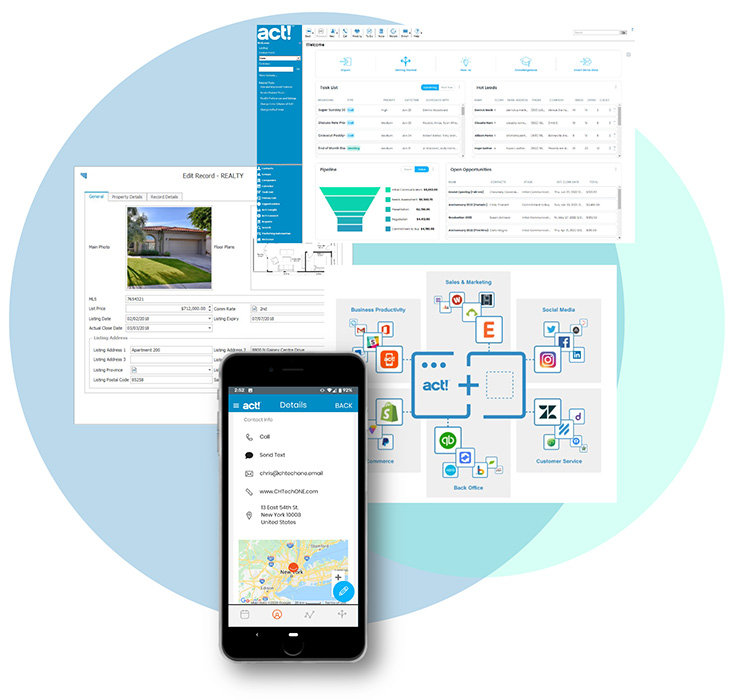The insurance industry is fiercely competitive — but of course, as an insurance professional, you already know that. If you’re struggling to grow your business and capture more of the insurance market, it’s important to understand what’s holding you back so you can meet those challenges head-on.
If you’re an independent agent or run a small insurance business, chances are you’re wearing more hats than ever before. From attracting prospective clients to scheduling appointments, onboarding new agents, managing data, and closing sales, it can demand more time than you have in a day.
Even if you’re using various apps and software solutions to stay organized, they may actually create more work if those technologies don’t talk to each other. If you’re not using a customer relationship management (CRM) platform to streamline operations, now might be a good time to take a closer look at how insurance CRM software can help you do more with less.
What are the big challenges facing the insurance industry?
First, let’s dive into some of the top challenges that keep many insurance brokers from achieving their business goals.
1. Competition is off the charts.
It’s a familiar scenario: You receive an inquiry about an insurance policy, but when you follow up with the prospect, they’ve already signed with one of your competitors.
All too often, prospects are simply looking for the cheapest insurance rate, not an “insurance relationship.” If you’re routinely missing out on these inquiries, it might be time to learn how marketing automation can help you better engage prospects before they move on to your competitors. Marketing and sales automation can also help qualify leads more effectively so you or your agents aren’t wasting time following up with prospects who are unlikely to convert.
2. Your insurance sales process is inefficient.
When’s the last time you revisited your sales process? Are you still relying on email to manage contacts or storing account information in Excel spreadsheets? If you don’t have a single source of all your client information, including contact information, purchases, history, interactions, follow-up, etc., then you’re likely missing out on key marketing and upselling opportunities.
3. Your workflow is overloaded with time-consuming tasks.
Let’s face it: Repetitive, manual tasks can sap your productivity and your energy. For instance, are you copying and pasting updated client contact information between apps? Are you manually sending out insurance policy renewal reminders and other client communication?
It might be worthwhile to track how much of your workday is spent on manual tasks, and which ones take up most of your time. Then you can identify which of these tasks could be automated so you can free up more of your time for productive client engagement and revenue generation.

Source: https://www.salesmate.io/blog/crm-for-insurance/
4. The lead generation struggle is real.
As you already know, insurance is one of the most important things anyone can have to protect themselves and their loved ones. And yet, customers hate the perceived sales hassle that has stereotyped the insurance buying process.
For example, some experts believe that insurers need to pivot their marketing efforts toward millennials, who will soon replace baby boomers as their primary customer base. Millennials also represent the least insured generation, which makes them a valuable opportunity. However, they are also a generation that rejects traditional hard sales tactics. Unlike previous generations, they need to be engaged through multiple platforms like social media, emails, online forums, and more.
How can you overcome these marketing challenges and attract new leads using a variety of marketing platforms and engagement approaches?
Chances are, you need a solid marketing strategy that appeals to a wide range of demographics across various age ranges, income levels, professions, geographic areas, and more. Insurance CRM can help you create targeted lead generation campaigns so you can attract highly qualified prospects across multiple platforms. Best of all, you can automatically capture their information and generate notifications for immediate follow-up.

5. Attracting new customers is great, but you’re losing existing customers.
If you’re noticing patterns of customer attrition, it’s critical to find out why. This can be difficult if your sales and marketing data is scattered across multiple apps and management systems, which makes it hard to identify trends.
For instance, are you losing policyholders across the board or is there a larger problem in certain areas? For example, home and life insurance customer retention rates may be fairly stable while a large number of auto insurance customers have migrated to your competition.
No matter where the issue lies, the best insurance CRM software can help you generate valuable business insight to identify current growth and retention challenges among your customer base.
How does CRM work for financial advisor companies?

A CRM solution captures and stores all of your essential sales and marketing information. You can then use that data to understand sales trends across demographics and even within individual accounts. The best CRM software also provides advanced analytics and other key features that help you gain business insight through easy-to-understand metrics about your sales and marketing campaigns.
CRM tools also automate many of your most tedious, manual tasks so you and your team can work more productively. Here are some of the key benefits you get from a CRM:
Automate lead capture and management
Insurance agencies are typically swamped with requests for quotes and pricing. An insurance CRM solution can help you automatically capture lead information from your website and allocate the most qualified leads to your sales team for real-time follow-up.
Automated lead management and lead scoring enable your agents to quickly follow up and nurture prospects through the sales pipeline, which saves time while pushing more valuable leads to the top of the list.
Boost lead conversion rates
To increase conversion rates, it’s essential to know as much as possible about them. Did they respond to an email marketing campaign, social media promotion, Google Ad, or another type of offer? What type of insurance are they looking for? Have they shared any other information that can help you nurture them across the sales cycle and convert them more quickly?
A CRM can capture all of this data in one place so your reps can get the insight they need to quickly convert more prospects into loyal customers.
Increase customer retention
Happy customers are long-term customers. With all of your customer data in one place, you can easily build personalized customer relationships based on their past purchases and future needs and preferences. You can also save time by automating essential communications, such as notifications and phone calls about upcoming policy renewals and changes. Even simple changes can help you dramatically improve the customer experience, and ultimately, customer satisfaction.
Create and customize impactful marketing campaigns
A CRM system can help you create highly effective — and highly customized — email marketing campaigns based on your valuable data. You can easily target promotions and offers to specific audiences and nurture them through the customer journey. You can also refine your messaging and tactics using metrics generated through A/B testing and other insight to help you achieve the results you want.
Best of all, a good CRM will provide you with easily customizable templates to help you quickly create branded emails, landing pages, and more. So you save time while reaching more audiences with personalized, relevant content.
Streamline sales team workflows and improve productivity
Insurance agents deal with tons of client paperwork. Whenever they have to manually enter data, it increases the chances of lost or inaccurate data entry. CRM software provides customer and contact management that allows you to capture all client interactions and messages in a shared environment, so any agent can pick up where a previous one left off.
Plus, when customer account data is updated, such as an address or phone number, it’s automatically updated across all client records. This eliminates the inconsistency of managing customer contact information in one app and account history in another. What’s more, reps no longer have to manually copy and paste data. All of this ensures your team always has the most accurate and complete information at their fingertips.
Achieve higher productivity and ROI
CRM marketing tools don’t just help you streamline agency management. They can also help you improve the customer experience through better customer support and communication. And this, in turn, leads to more customer referrals and sales — all by enabling your reps to work smarter, not harder.
As a result, some studies show that CRM can improve productivity by as much as 55%, increase sales by 45%, reduce labor costs by 60%, and improve customer relationships by 58%.
Increase revenue
Growing your client base is essential to increase revenue, but you also have to generate opportunities to upsell and cross-sell new products and services to existing customers. With detailed intelligence about your current clients, you can send personalized messages and offers that best meet their changing life circumstances, such as the birth of a child, a new home purchase, or adding another driver to their current policy.

Improve sales forecasting
With insightful sales reports and analytics, you can predict future sales trends based on past sales figures. You can also identify and proactively address issues that may impact future sales, such as competitive factors, regulatory changes, changes in your customer base, and more.
Scale your solution as your needs change
No insurance agency should pay for CRM features and functionality they aren’t using. For this reason, it’s essential to choose a CRM that can scale with you as your business expands.
Act! Premium checks all the boxes for an advisor CRM

Act! provides insurance companies access to CRM and marketing automation tools to grow their relationships and meet their ambitious business goals. Discover how Act and The Advisor Add-on can support your small business with better marketing and data tracking tools that attract more qualified leads and convert them into loyal customers.
Act! Premium offers flexible customizations and app integrations to accommodate the unique ways you work. We’re committed to meeting your specific needs regardless of your budget and company size.
